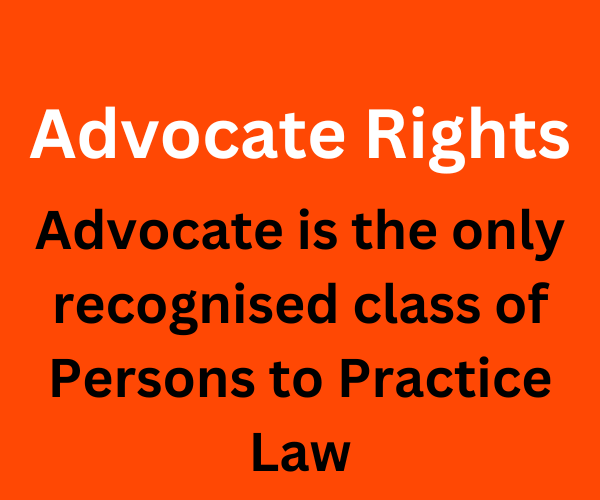In this post, we have discusses the Advocate/Lawyer/Vakil(Vakeel) rights which explained Under the provision of Advocate act 1961,
- S. 29 says Only one class person namely-Advocate is entitled and has the authority/right to practice law profession.
- Under S.30 advocate act 1961: Every state-enrolled advocate has the right to practice in any court(including supreme court), tribunal etc within the territories as to the advocate act expanded.
- An advocate is the only representative/agent who can conduct any case of his parties in court. A law graduate enrolled as an advocate in any state bar council is an agent and has the authority to defend his clients.
- Advocate is the part of administration of justice; Being a member of Bar council and an Officer of the court, Advocate is entitled to sit in the courtroom.
- An advocate has the right to lien(to retain documents, deeds, papers belonging to another) in his possession until he get his fee/payment for work done.
- An advocate is empowered to get remuneration(payment) from his client by making a valid contract in conducting a case.
- An Advocate has authority to compromise on behalf of his client; Means after receiving the consent of the party, in the place of a client, an advocate can enter into a compromise for getting settlement.
- An Advocate is empowered to inspect the document regarding his client case; after taking permission of court, he is entitled to see/check the public file, records, or documents which are concerning in his party case.
- For taking assistance in his profession, An advocate can obtain the copies of public documents- decree, orders, and proceedings of cases.
- An advocate can cite past decisions of supreme court, high court as an argument for the support of his client case. However, in some situations such citations(example) may be submitted later with the permission of court.
- An advocate has the right to submit briefs to any other advocate; If the advocate is not present on a particular day, he can submit his brief to another lawyer.
- An advocate is empowered to be appointed as a paid commissioner for the inspection of disputed property. He has the right to get the payment from the client for his work. For attesting the documents, in criminal and civil cases advocate may be appointed as Oath Commissioner by District court, but in revenue cases oath commissioner appoints by collector.
- S 126 of Indian Evidence Act 1872 says, An advocate has right to keep secret communication of his client. He can not disclose his client’s case details to vakil, barrister, judge, lawyer or any other person; but in case when his client has a guilty mind or guilty intention, the advocate is not bound to disclose personal information between him and his client.
- An advocate has the right to apply for a public Notary, and as a notary he can attest the affidavit and other documents.
- For the protections of disputed property, an advocate is entitled to be appointed as a receiver of the property until the final disposition of a pending case in court.
Advocate is the only recognised class of Persons to Practice Law
Chapter IV Section 29 of the Advocate Act 1961 says, there shall be only one class of persons entitled to practice the profession of law, namely Advocates. So, no other person under this law is empowered to practice in the legal field other than the Advocates.
Right of Practice
Section 30 says, Every advocate whose name is entered in the state-roll as an advocate shall be entitled to practice the profession of law throughout the territory to which this act is extended.
An advocate has the following rights of practice under the law-
- Right to practice In all Courts including the Supreme Court of India.
- Right to practice before any Tribunals, or any person who is legally authorized to take the evidence.
- Right to practice before any person or Authority to whom the advocate is entitled to practice law under any law for the time being in force.
Advocates alone entitled to practice
Under the advocate act 1961, S.33 Only a person who is on or after the day enrolled in state as an advocate shall be entitled to practice as an advocate before the court or any authority or person.
High court may make rules regarding the practice of Advocates
The high court has the power to make the rules regarding which advocates shall practice in the high courts and which shall practice in the subordinate courts, S.34 of advocate act.
